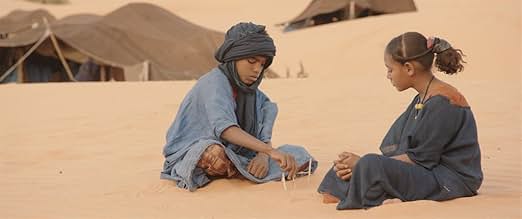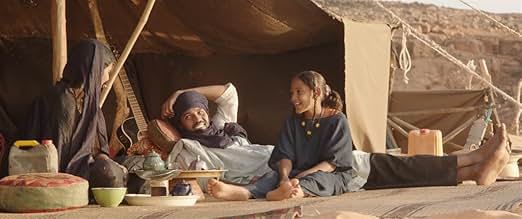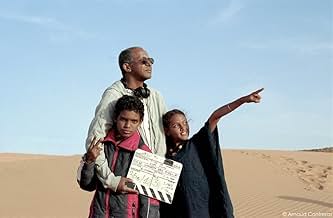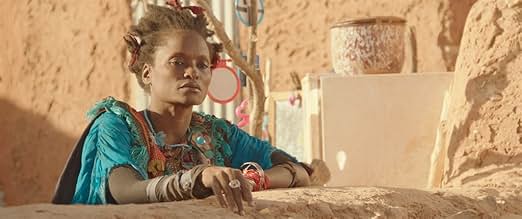AVALIAÇÃO DA IMDb
7,1/10
19 mil
SUA AVALIAÇÃO
Adicionar um enredo no seu idiomaA cattle herder and his family who reside in the dunes of Timbuktu find their quiet lives -- which are typically free of the Jihadists determined to control their faith -- abruptly disturbed... Ler tudoA cattle herder and his family who reside in the dunes of Timbuktu find their quiet lives -- which are typically free of the Jihadists determined to control their faith -- abruptly disturbed.A cattle herder and his family who reside in the dunes of Timbuktu find their quiet lives -- which are typically free of the Jihadists determined to control their faith -- abruptly disturbed.
- Direção
- Roteiristas
- Artistas
- Indicado a 1 Oscar
- 33 vitórias e 28 indicações no total
Ibrahim Ahmed
- Kidane
- (as Ibrahim Ahmed dit Pino)
Yoro Diakité
- Djihadiste
- (as Yoro Diakite)
Weli Kleïb
- Juge
- (as Weli Cleib)
- Direção
- Roteiristas
- Elenco e equipe completos
- Produção, bilheteria e muito mais no IMDbPro
Avaliações em destaque
A film about the daily reality of Islam fundamentalism is a courageous project - even more so when the maker himself is a Muslim. For this reason alone, 'Timbuktu' cannot be praised enough. It will get plenty of international exposure, because this film is the first ever Oscar entry from Mauritania, and luckily it made the Foreign Language shortlist of nine candidates, out of 83 entries.
'Timbuktu' shows how Libyan jihadists invade Mali and turn the lives of the locals upside down. The Malinese are no longer allowed to play music or to smoke cigarettes, the women are obliged to cover their heads when in public, and sharia courts are issuing cruel and undeserved punishments. In spite of all this, the film is not at all harsh or bleak. On the contrary, most scenes show the Malinese living an idyllic life and trying to make the best of the situation. Some scenes are almost hilarious: the jihadists have to cope with serious language barriers to get their message across, they are unable to drive cars and even break their own rules by secretly smoking cigarettes.
Filmed in neighbouring Mauritania, the movie is full of beautiful landscapes, nice buildings and good-looking people. This is exactly what bothered me a little bit: sometimes you have the impression that you're watching a documentary on National Geographic Channel, showing the beauty of Mali. I can't imagine life in this dirt poor country being even half as peaceful and harmonious as is suggested in this film. A little more third world realism would have been appropriate, including the daily struggle for life of people living in extreme poverty.
Nevertheless, the film is a joy to watch, and contains some extremely beautiful scenes. One example is the scene of a football team playing a game without a ball, because it is confiscated by the jihadists. A perfect and original way to show how Muslim fundamentalism can be defeated, against all odds.
'Timbuktu' shows how Libyan jihadists invade Mali and turn the lives of the locals upside down. The Malinese are no longer allowed to play music or to smoke cigarettes, the women are obliged to cover their heads when in public, and sharia courts are issuing cruel and undeserved punishments. In spite of all this, the film is not at all harsh or bleak. On the contrary, most scenes show the Malinese living an idyllic life and trying to make the best of the situation. Some scenes are almost hilarious: the jihadists have to cope with serious language barriers to get their message across, they are unable to drive cars and even break their own rules by secretly smoking cigarettes.
Filmed in neighbouring Mauritania, the movie is full of beautiful landscapes, nice buildings and good-looking people. This is exactly what bothered me a little bit: sometimes you have the impression that you're watching a documentary on National Geographic Channel, showing the beauty of Mali. I can't imagine life in this dirt poor country being even half as peaceful and harmonious as is suggested in this film. A little more third world realism would have been appropriate, including the daily struggle for life of people living in extreme poverty.
Nevertheless, the film is a joy to watch, and contains some extremely beautiful scenes. One example is the scene of a football team playing a game without a ball, because it is confiscated by the jihadists. A perfect and original way to show how Muslim fundamentalism can be defeated, against all odds.
"Timbuktu" (2014 release from Mauritania; 99 min.) brings the story (fictional, by influenced by real events) of how the Mali town copes with the 'liberation' by jihadis. As the movie opens, we see the jihadis having a shooting practice by destroying the local wood statutes. The jihadis issue all kinds of rules ("smoking is forbidden! music is forbidden!"), much to the irritation of the local Mali population. We get to know one local family in particular, a husband and wife with their 12 yr. old daughter. They live a bit outside of the city center where the desert takes over, going about their daily business as best as possible. Then one day, one of the husband's cow accidentally destroys the fishing nets of the fisherman, who promptly kills the cow. The husband decides that he cannot tolerate this. To tell you more would spoil your viewing experience, you'll just have to see for yourself how it all plays out.
Couple of comments: first, it is a small miracle that a movie like "Timbuktu" could even have been made. Writer-director Abderrahmane Sissako shot the movie in Mauritania, which subs for Mali, but let's not kid ourselves. Mauritania is an "Islamic Republic", so it was no easy feat to shoot there either. Second, Sissako demonstrates again and again how much the local population resends the jihadis for uprooting their lives. There are several scenes in which a local man pleads with the jihadis ("where is forgiveness? where is leniency?"), to no avail of course. Playing soccer will cost you 20 leashes. Playing music comes at 40 lashes. Being in the room with someone from the opposite sex is another 40 lashes, and on and on. The fact that the neither side can understand the other (they speak Tamasheq in Timbuktu, the jihadis mostly speak Arabian, some also speak French or English) only makes the entire situation even more absurd. Second, while there are some shocking scenes in the movie, overall this is not a violent or graphic film. Almost on the contrary, in that the movie's editing and photography is done in such a way that it induces a false sense of peace and security. The photography in particular is pure eye-candy. Third, I have no idea where Sissako found these performers, but there are some wonderful performances, in particular from the wife and the 12 yr. old daughter. Bottom line: there is a good reason why this film is nominated for the Best Foreign Language Oscar, as it is a deeply moving film that will stay with you long after you have seen it.
The movie finally opened this weekend at my local art-house theater here in Cincinnati, and I went to see it right away. The matinée screening where I saw this at today was attended okay but not great, although I'm hoping that the bitter cold weather is a factor for that. If you like a top-notch foreign film that provides a glimpse of what real life under jihad is like, you cannot go wrong with this. "Timbuktu" is HIGHLY RECOMMENDED!
Couple of comments: first, it is a small miracle that a movie like "Timbuktu" could even have been made. Writer-director Abderrahmane Sissako shot the movie in Mauritania, which subs for Mali, but let's not kid ourselves. Mauritania is an "Islamic Republic", so it was no easy feat to shoot there either. Second, Sissako demonstrates again and again how much the local population resends the jihadis for uprooting their lives. There are several scenes in which a local man pleads with the jihadis ("where is forgiveness? where is leniency?"), to no avail of course. Playing soccer will cost you 20 leashes. Playing music comes at 40 lashes. Being in the room with someone from the opposite sex is another 40 lashes, and on and on. The fact that the neither side can understand the other (they speak Tamasheq in Timbuktu, the jihadis mostly speak Arabian, some also speak French or English) only makes the entire situation even more absurd. Second, while there are some shocking scenes in the movie, overall this is not a violent or graphic film. Almost on the contrary, in that the movie's editing and photography is done in such a way that it induces a false sense of peace and security. The photography in particular is pure eye-candy. Third, I have no idea where Sissako found these performers, but there are some wonderful performances, in particular from the wife and the 12 yr. old daughter. Bottom line: there is a good reason why this film is nominated for the Best Foreign Language Oscar, as it is a deeply moving film that will stay with you long after you have seen it.
The movie finally opened this weekend at my local art-house theater here in Cincinnati, and I went to see it right away. The matinée screening where I saw this at today was attended okay but not great, although I'm hoping that the bitter cold weather is a factor for that. If you like a top-notch foreign film that provides a glimpse of what real life under jihad is like, you cannot go wrong with this. "Timbuktu" is HIGHLY RECOMMENDED!
One of the movies that's still in the running for a "Best Foreign Language Film" Oscar nomination, is Timbuktu. Together with the Estonian Mandariinid it's one of my favorites for this year's Academy Awards, but I'm afraid only one of them will make it to the shortlist and neither of them will eventually win the Oscar. Not while movies like Ida, Turist and Leviathan are their competitors (although I think Timbuktu and Mandariinid are better than those three). The thing about Timbuktu that makes it such a beautiful picture, is its, what I presume, authentic representation of Muslims and the different views on Islamic religion. Spoken in a number of languages, from French and English to Arabic and a wide diversity of African languages (Tamasheq, Bambara and Songhay), Timbuktu shows Westerners a part of the world we almost know nothing about. Apart from judgemental and arrogant claims about the (religious) backwardness of many people there, be they Berber or Bedouin, many people here just don't know what to say about the Northern part of Africa. Director Abderrahmane Sissako gives us lots of stuff to talk and think about (for example the use of "jihad" as on the one hand an inner struggle (the greater jihad) and on the other hand an external holy war which is fought by mujahideen - the second jihad being the one we fear and loathe so much in the West). Not only that, but together with his cinematographer Sofian El Fani (La Vie d'Adèle) he manages to provide us with wonderful visual poetry and exceptional sceneries of south-east Mauritania. While it took some getting used to the narrative and the editing, I was full of awe after enjoying this utterly majestic work of art. Highly recommended!
"Let me say this loud and clear. There is a world of difference between terrorist acts and the Islamic Shari'a. Islam is not only a religion, but a way of life. And at its heart lie the sacred principles of tolerance and dialogue." King Hussein I
A popular cliché is to refer to "Timbuktu" as the farthest, out-of-it-all place on earth, like "You can go to Timbuktu for all I care." However, in writer/ director Abderrahmane Sissako's remarkable film, Timbuktu, the world rests in miniature in the sand dunes of gorgeous Mali, where a Bedouin family can languish in the shade of their tent while a small boy herds their cattle and nearby fishmongers ply their trade by a welcoming pond. It is a world seemingly removed from stress, a paradise.
In the cell-phone age, no one is too far away and paradise easily shattered, as the natives use their phones to coordinate their herds and their lives. So do the Muslim jihadists, who use their phones to control the natives, bending them to their will on such mundane matters as wearing gloves and playing music. In a way, the low-key policing by the jihadists employing Shari'a seems to contrast with the notorious ISIS, whose control extends to burning and beheading.
All is relatively tame until one Bedouin's pregnant cow is killed by a fishmonger, and the herder murders in revenge. The Long-distance wide-angle shot of the two men in a death struggle is remarkably beautiful and ominous, like David Lean's memorable Lawrence of Arabia scenes.
The local jihadist authority follows God's law in this case while it takes a woman into custody for not wearing gloves and carries out murderous punishment on musicians. This tranquil paradise slowly becomes a hotbed of repression while the director still shoots lovely scenes that belie the suppression already reaching into the lives that seemed so far removed.
Underneath the obvious meting out of "justice" is the subjugation of women, almost as if radical Muslim orthodoxy had this prejudice as its cornerstone. This film drives that oppression home as few others have done because it makes it a quiet but persistent issue in daily activity. The very peacefulness of the living in Mali and the sweet sparseness of the mise en scene could almost make us think the radicalism is acceptable. But when you see men buried in sand and rocks thrown at their heads, you know life in the sand in not romantic.
Timbuktu is rated PG-13, a triumph in good taste as murder and subjugation are the dominant activities. A film that allows young persons to see the world's injustices through a beautiful lens is a film worth sharing in the hope of removing radical Islamists from paradise. Let them have their virgins and soon.
A popular cliché is to refer to "Timbuktu" as the farthest, out-of-it-all place on earth, like "You can go to Timbuktu for all I care." However, in writer/ director Abderrahmane Sissako's remarkable film, Timbuktu, the world rests in miniature in the sand dunes of gorgeous Mali, where a Bedouin family can languish in the shade of their tent while a small boy herds their cattle and nearby fishmongers ply their trade by a welcoming pond. It is a world seemingly removed from stress, a paradise.
In the cell-phone age, no one is too far away and paradise easily shattered, as the natives use their phones to coordinate their herds and their lives. So do the Muslim jihadists, who use their phones to control the natives, bending them to their will on such mundane matters as wearing gloves and playing music. In a way, the low-key policing by the jihadists employing Shari'a seems to contrast with the notorious ISIS, whose control extends to burning and beheading.
All is relatively tame until one Bedouin's pregnant cow is killed by a fishmonger, and the herder murders in revenge. The Long-distance wide-angle shot of the two men in a death struggle is remarkably beautiful and ominous, like David Lean's memorable Lawrence of Arabia scenes.
The local jihadist authority follows God's law in this case while it takes a woman into custody for not wearing gloves and carries out murderous punishment on musicians. This tranquil paradise slowly becomes a hotbed of repression while the director still shoots lovely scenes that belie the suppression already reaching into the lives that seemed so far removed.
Underneath the obvious meting out of "justice" is the subjugation of women, almost as if radical Muslim orthodoxy had this prejudice as its cornerstone. This film drives that oppression home as few others have done because it makes it a quiet but persistent issue in daily activity. The very peacefulness of the living in Mali and the sweet sparseness of the mise en scene could almost make us think the radicalism is acceptable. But when you see men buried in sand and rocks thrown at their heads, you know life in the sand in not romantic.
Timbuktu is rated PG-13, a triumph in good taste as murder and subjugation are the dominant activities. A film that allows young persons to see the world's injustices through a beautiful lens is a film worth sharing in the hope of removing radical Islamists from paradise. Let them have their virgins and soon.
For someone raised in Mauritania as I was, it was quite something to watch the first Mauritanian movie nominated for a Foreign Film Oscar. I saw it in, of all places, in a movie theatre in Rio de Janeiro, the first week of its release in Brazil.
The language of cinema is truly universal as you see people who belong to an entirely different culture react in a similar way to someone from that culture. Of course there are some references not easy to get, such as the one to music lauding the Prophet by Mauritanian female artist Dimi mint Abba which is heard in a key scene showing how absurd these Islamists' prohibitions are.
Unsure, also, whether people can tell when different actors use different languages (Arabic, Tuareg, Bambara etc.).
The soccer game scene is one of the best I saw this year on the big screen, and the one with the killing of astounding beauty.
Definitely a great director at work here, despite obvious limited resources.
The language of cinema is truly universal as you see people who belong to an entirely different culture react in a similar way to someone from that culture. Of course there are some references not easy to get, such as the one to music lauding the Prophet by Mauritanian female artist Dimi mint Abba which is heard in a key scene showing how absurd these Islamists' prohibitions are.
Unsure, also, whether people can tell when different actors use different languages (Arabic, Tuareg, Bambara etc.).
The soccer game scene is one of the best I saw this year on the big screen, and the one with the killing of astounding beauty.
Definitely a great director at work here, despite obvious limited resources.
Você sabia?
- CuriosidadesThe scene in which the cow was killed with a spear was done by sedating the cow under the supervision of a veterinarian and adding the spear digitally in post production - the animal was not harmed.
- Erros de gravaçãoIn the stoning scene, both man and woman are buried up to their necks. In a proper Islamic stoning (rajm), the woman should only be buried up to her waist.
- ConexõesFeatured in Cerimônia do Oscar 2015 (2015)
- Trilhas sonorasShooting The Statues
Composed, Arranged and Orchestrated By Amin Bouhafa
with The City of Prague Philharmonic Orchestra
© 2014 Universal Music France
Principais escolhas
Faça login para avaliar e ver a lista de recomendações personalizadas
- How long is Timbuktu?Fornecido pela Alexa
Detalhes
- Data de lançamento
- Países de origem
- Centrais de atendimento oficiais
- Idiomas
- Também conhecido como
- Timbuktú
- Locações de filme
- Oualata, Mauritânia(as Timbuktu)
- Empresas de produção
- Consulte mais créditos da empresa na IMDbPro
Bilheteria
- Faturamento bruto nos EUA e Canadá
- US$ 1.076.075
- Fim de semana de estreia nos EUA e Canadá
- US$ 45.110
- 1 de fev. de 2015
- Faturamento bruto mundial
- US$ 7.179.391
- Tempo de duração1 hora 36 minutos
- Cor
- Proporção
- 2.35 : 1
Contribua para esta página
Sugerir uma alteração ou adicionar conteúdo ausente



























